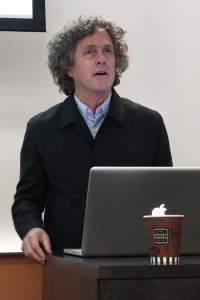Professor hopes to increase USC faculties’ role
On Monday, University of California, Santa Barbara professor Christopher Newfield, spoke with USC faculty about their role in university governance.

Faculty advocate · University of California, Santa Barbara professor, Christopher Newfield, spoke to USC faculty in Leavey Auditorium Monday afternoon on the need to increase their role in administrative decisions. – Jessica Zhou | Daily Trojan
Newfield represented the American Association of University Professors at the event and discussed issues in the current process for decision making and the need to increase the voice of faculty in the university setting. He has long advocated the need for professors to take a leading role in administrative decisions.
“The administration is oppressive, and faculty are submissive,” Newfield said.
Until the American Association of University Professors was instituted on campus last year, Newfield said there was no faculty body that could raise issues of tenure and low salaries without administration present.
AAUP Western Regional Coordinator Jason Elias said Monday’s talk marked one of the first meetings of the AAUP on USC’s campus, and after many of the recent disagreements between the administration and faculty, it was an opportune time.
Elias noticed that last semester, poetry professor Cecilia Woloch was forced to leave when the university administration cut her stipend for the two Dornsife programs she created and Woloch could no longer afford to live in Los Angeles.
“That the administration has used those programs to try to recruit ‘transformative’ faculty — at five times my salary — while refusing to even mention my name in association with those programs, makes it clear to me that I’ll never be recognized or rewarded for my contributions,” Woloch wrote in a letter to USC officials at the time.
Elias said the disagreement exemplified the issue of inadequate and non-tenure track salaries, as well as the university’s mistreatment of esteemed faculty.
“[Dornsife] Dean [Steve] Kay’s new interpretation of the faculty handbook is that if a tenured faculty doesn’t attend a meeting, they cannot know the outcome or the discussions during the tenure meeting,” Elias said.
But Newfield said university administrators’ mistreatment of faculty is not an isolated issue. He said last year a UCLA professor filed a racial discrimination suit against the university after he was called a “gorilla” at an event where students mock their professors.
Christian Head was the only African-American tenured professor at the school’s department of head and neck surgery. Head received a 4.5 million dollar settlement, according to the Los Angeles Times.
Newfield said it is important for universities to remain accountable for treating their faculty respectfully and to foster an atmosphere of creativity so that students can take advantage of their expertise.
“[Universities] should be faculty decision zones as opposed to faculty consultation zones,” Newfield said.


This article misses almost all the main points of Professor Newfield’s talk. It makes no mention, for example, of his key argument that universities have tended not to take advantage of the expertise of their own faculty in making important decisions about the direction and future investments of the institution. It especially misses the tone and tenor of the talk, which sought above all to encourage faculty to reinvigorate shared governance structures. Finally, although the event was sponsored by the AAUP chapter at USC, Professor Newfield was invited as an independent scholar and the author of highly celebrated work on the American university.
Peggy Kamuf
Professor of French and Comparative Literature
While I appreciate your coverage of the event described above, the piece has a couple of mistakes worth mentioning. Although the AAUP sponsored the event, I do not represent the AAUP in any way. My talk described several recent controversies that might have been averted had faculty been made central to administrative decisions at the start. The rise and rapid fall of Massive Open Online Courses was one example, since faculty knew from the beginning that the educational claims made by MOOC advocates were grossly exaggerated. I also discussed four features of meaningful faculty self-governance. I don’t think that oppression/submission is the general state of admin-faculty relations either at USC or anywhere else. I did describe it as a tendency when faculty are overly passive about the fates of their teaching (and non teaching) colleagues. Towards the end of the event, members of the audience described some personnel decisions on this campus that seemed aberrant to me, and these cases may be something the academic senate here will want to review. Finally, I’d add that students also have an interest in good academic personnel processes, since bad ones can lower the quality of the instruction they get in their courses.